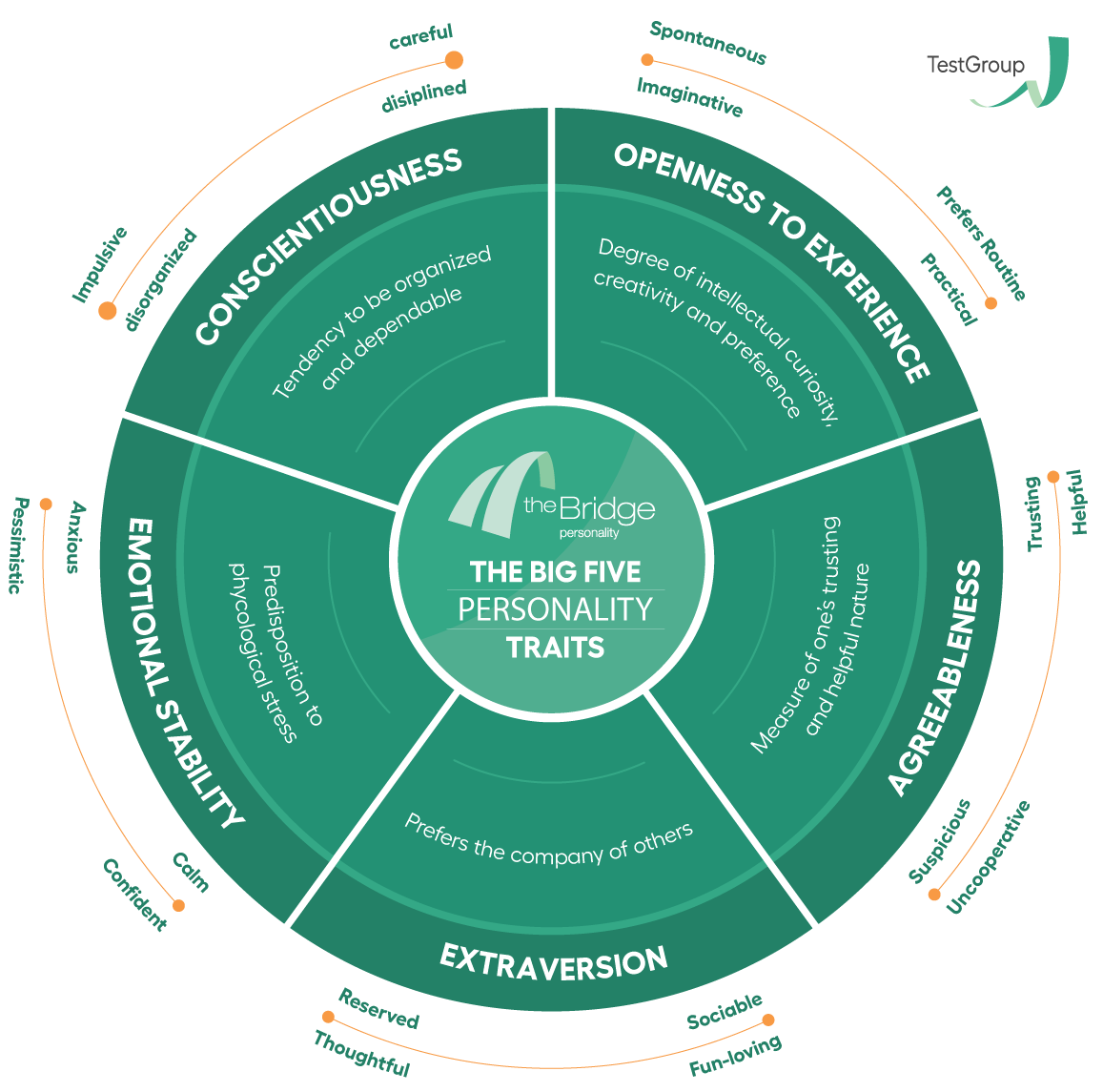Big Five personality test: Openness to Experience
For over 15 years, The Bridge Personality has been the most used Big Five personality test for companies and organizations in many countries worldwide. This leading Big Five test evaluates personalities based on the renowned Big Five theory, recognized as the most effective approach for assessing candidates in selection procedures. According to the Big Five theory, a person's character consists of five fundamental traits. These essential characteristics form the basis of what is known as the Big Five, or the five personality factors.
You can order this Big Five personality test individually (per candidate) or administer it yourself through an affordable assessment subscription.
The Big Five personality test, scientifically supported, maps these five core aspects of personality: Openness to Experience, Conscientiousness, Extraversion, Agreeableness, and Emotional Stability, collectively known as the Big Five. This model, also referred to as the OCEAN model, is a popular choice in the recruitment and selection process due to its solid scientific foundation.

What is the Big Five personality trait: Openness to Experience?
Openness to experience, also known as openness, is a fundamental personality trait in the Big Five personality test that signifies a willingness to embrace new ideas and experiences. It's a key component of the Big 5 personality model. Highly open individuals are inclined to pursue diverse experiences, are at ease with the unknown, and are deeply in tune with their feelings. They are typically curious and enjoy unexpected events. In contrast, those with low openness favor routine and familiar settings and may come across as closed-minded.
This trait is linked to creativity, inquisitiveness, and a passion for learning and knowledge. Open individuals are often innovative thinkers, capable of generating various unique solutions to complex problems. Openness is associated with greater overall well-being and happiness, fostering positive relationships and a warm disposition towards others. Interestingly, there's no significant link between openness and anxiety or mood disorders.
Highly open people are adventurous, eager to explore new things like unfamiliar cuisines or destinations. They are naturally curious, continuously seeking knowledge. However, they might be less practical and analytical, leaning more towards creativity and adaptability to change.
The science of Openness to Experience
Openness to Experience is one of the Big Five personality model's key aspects, encompassing traits like tolerance for ambiguity, aesthetic appreciation, and curiosity (Costa & McCrae, 1992). It's complex because these traits aren't clearly connected. While often mistaken for intelligence, Openness is distinct, though modestly related to education and intelligence tests like the Wechsler Adult Intelligence Scale (McCrae & Costa, 1987).
People high in Openness are imaginative, enjoy art, are introspective, willing to try new things, and nontraditional (McCrae & Costa, 1997). This trait impacts their social circles, political and religious affiliations, and even career paths. Psychologists tend to be more open, though not everyone sees Openness as favorable, with it being linked to some negative outcomes like depression and drug experimentation (McCrae & Costa, 1987). Openness involves creativity, embracing unusual ideas, and tolerating ambiguity (McCrae & Costa, 1997). It's suggested that Openness correlates with higher IQ (McCrae & Costa, 1987) and is influenced by birth order, with first-borns leaning towards intellect-focused traits and later-borns towards novelty (Sulloway, 1996).
The impact of Openness on well-being is mixed and depends on the specific facet considered (Jonassaint et al., 2007; Turiano, Spiro, & Mroczek, 2012; Goodwin & Friedman, 2006; Noftle & Shaver, 2006). It may introduce variability in well-being, contrasting with the stabilizing effect of traits like conscientiousness (McCrae & Costa, 1997).
Which Bridge Personality dimensions measure Openness to Experience?
The Bridge Personality measures 34 personality facets that are linked to the Big Five personality traits. The facets that measure Openness to Experience are:
The Bridge Tests & Online Assessments
TestGroup is the official provider of the renowned Bridge tests and online assessments, which are high-quality, scientifically validated psychometric tools used globally. Developed in collaboration with universities around the world, these assessments predict workplace behavior through personality tests, cognitive ability evaluations, and career assessments. We assist organizations globally in using online assessments.















